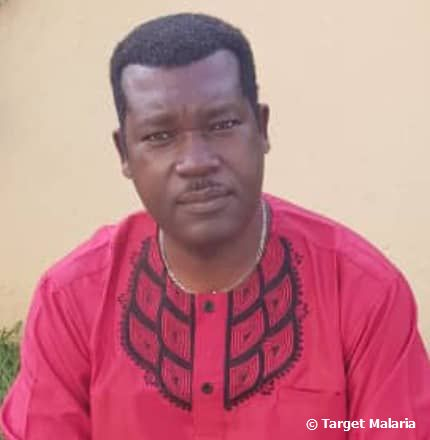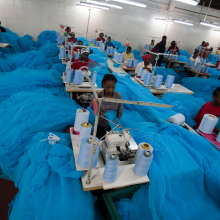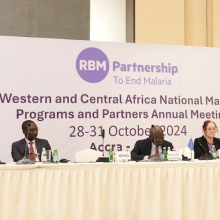This World Mosquito Day, we speak to Professor Abdoulaye Diabaté, Principal Investigator at Target Malaria Burkina Faso
Hello Professor Diabaté, thank you for speaking to us this World Mosquito Day! Can you start off by telling us a little about your role at Target Malaria?
I am the Principal Investigator of Target Malaria Burkina Faso, and also serve as Head of Medical Entomology and Parasitology at the Research Institute in Health Sciences (Institut de Recherche en Science de la Santé (IRSS) /Centre Muraz) in Bobo-Dioulasso, Burkina Faso. I joined Target Malaria in 2012, and established the Target Malaria Burkina Faso team.
What is gene drive, and how is Target Malaria using this technology to tackle malaria?
Gene drive is a naturally occurring genetic phenomenon that biases inheritance. It causes a selected trait to spread rapidly through a species via sexual reproduction over several generations. Gene drive works by increasing the likelihood that a modified gene will be inherited by its offspring. Normally, genes have a 50/50 chance of being inherited, but gene drive systems could increase that chance to upwards of 99 percent. This means that over the course of several generations a selected trait could become increasingly common within a specific species.
Target Malaria is investigating harnessing gene drive to spread a modification in malaria mosquitoes that would affect the mosquito’s ability to reproduce, thereby reducing the mosquito population and altering disease transmission. There are over 3,500 species of mosquitoes globally, and over 800 in Africa. Target Malaria’s research is targeting the three species most responsible for transmission of the disease: Anopheles gambiae, Anopheles coluzzii and Anopheles arabiensis.
We are currently conducting studies on gene drive mosquitoes in the lab, in small cages in the UK at Imperial College London, and in large cages that mimic natural environments in Italy at Polo d'Innovazione di Genomica, Genetica e Biologia. Results from these studies have been very promising, with studies published in 2020 and 2021 showing that gene drive mosquitoes can successfully control mosquito populations in both small and large cages.
What are the latest developments/breakthroughs in the project?
In 2019, I led the team that conducted the first release of genetically modified mosquitoes in Africa. My team also successfully imported in 2022 a new strain of non gene drive genetically modified male bias mosquitoes. This was a significant achievement for the team, and the first time that this strain of mosquito was imported to Africa. The new strain was developed in the UK, tested in the UK and Italy and imported to the insectary at the Institut de Recherche en Sciences de la Santé (IRSS) in Bobo-Dioulasso, Burkina Faso. My team are currently conducting studies on this mosquito strain in the laboratory.
The mosquito is notoriously good at evolving to evade the latest malaria control tools – how is your work aiming to address this?
Malaria mosquitoes are becoming increasingly resistant to existing malaria control tools including insecticides and bed nets, and new tools and innovations are essential to stay ahead of the mosquito as it evolves. The conventional tools that we have at our disposal today have reached their limit.
Gene drive technology is well suited to the African context, where there is widespread incidence of malaria and prevalence in hard-to-reach rural areas. In principle, a limited number of genetically modified mosquitoes would need to be released to affect the malaria transmission and the mosquitoes would do the work. Gene drive approaches, by their self-sustaining nature, could – in conjunction with existing tools – offer long-term, sustainable and cost-effective methods to control Anopheles mosquito populations, the vectors of malaria in Africa.
While new technologies will help to accelerate progress, there is no silver bullet that will by itself eliminate malaria. Until we eradicate malaria, we will need constant innovation to stay one step ahead of evolution.
If implemented widely, how could gene drive transform the fight against malaria?
We are developing a gene drive mosquito strain in which the modification to the mosquito will be ‘self-sustaining’. It could potentially be a cost-efficient, long-term and sustainable vector tool that would complement existing and new tools and be very well suited for an African environment where malaria is a rural disease that strikes the vulnerable population, mostly children and pregnant women.
In principle, a limited number of genetically modified mosquitoes would need to be released to affect the malaria transmission and the mosquitoes would do the work. Gene drive approaches, by their self-sustaining nature, could – in conjunction with existing tools – offer long-term, sustainable and cost-effective methods to control Anopheles mosquito populations, the vectors of malaria in Africa.
How have local communities responded to the project?
Target Malaria has been engaging and working hand in hand with local communities since the start of mosquito research activities in Burkina Faso in 2012, and we use a number of innovative approaches to engagement including microprogrammes and theatre. There has been ongoing engagement with local communities since then, to build a solid foundation of trust without which the work would not be possible. These communities have been fully engaged with the project’s work, understanding and embracing the value of our research.
What will ultimately be needed to implement gene drive technologies safely and effectively in malaria-affected regions (e.g. regulation, funding…)
Target Malaria is still at an early stage of our work with no plans to release gene drive mosquitoes in the immediate future. The project is proceeding step-by-step, and at each phase the safety of the technology is being evaluated. External scientific advice and independent external risk assessment are being sought for each stage and phase of the research, and the project will not proceed further if evidence of a concern about human, animal health or environmental safety makes the technology unacceptable to participating communities and national governments. Our research is also subject to the approval of beneficiary communities and regulatory authorities, as well as environmental, social and health impact assessment audits.
Stakeholder engagement is a key pillar of our approach to responsible research. Alongside regulatory authorities, stakeholders will be the ones to decide if this technology can be evaluated in the field. Engaging with them ensures that the technology, and our project activities, are accurately and honestly communicated to all, and most importantly to the potential beneficiaries of this research in Africa.
If we are successful in developing a gene drive mosquito that can be used as a vector control tool, we will share our technology at little or no cost with national governments and their Malaria Control Programmes. It will be for them and the beneficiary communities to decide whether they want to use this technology in their country.
Why is it so important that the African continent builds its R&D capacity and encourages local scientists to drive new solutions in the fight against diseases like malaria?
African researchers are best placed to be the ones designing and conducting research on issues affecting African countries. Malaria is the perfect example of this. Many European or North American institutions have malaria research facilities although malaria was eradicated from these regions a long time ago. I believe that malaria research must be taking place in malaria endemic countries. Burkina Faso is committed to providing an enabling environment for such research and I hope many other African countries will position themselves as leaders in malaria research. In my position, I hope to inspire the new generation of young African researchers to take on career in STEM and more specifically in malaria research.
Do you have a message you would like to share with the malaria community this World Mosquito Day?
We must invest in training a new generation of African scientists to take on this research and be the generation to help draw the line against malaria.
Finally, can you tell us why you dedicate your career to the study of mosquitoes and fighting malaria this World Mosquito Day?
In my country, Burkina Faso, malaria rages every rainy season. In 2021, there were an estimated 8.3 million cases of malaria, that’s 37% of the whole population. Each and every one of us is at risk of getting infected. There were also 18,900 deaths, that’s 15% of all deaths. Malaria is one of the primary causes of consultations and hospital admissions.
Malaria is part of our everyday lives and rages havoc in our homes. Malaria has affected every aspect of my personal life: from nearly dying of the disease as a toddler, to taking care of my loved ones every time they get sick. I have therefore decided to dedicate my life to fighting this disease that stifles the development of Africa and breaks the future of millions of African lives. I am here today because of nurses, physicians, scientists and international donors. To all of them, I am grateful. They all inspired me to do the same and devote my life to fighting malaria.
My hope is to develop an effective and safe strain of gene drive mosquitoes that can be used in Africa with other vector control tools to dramatically decrease transmission rates and ultimately to reduce malaria cases and deaths on the continent.

Latest Blogs


